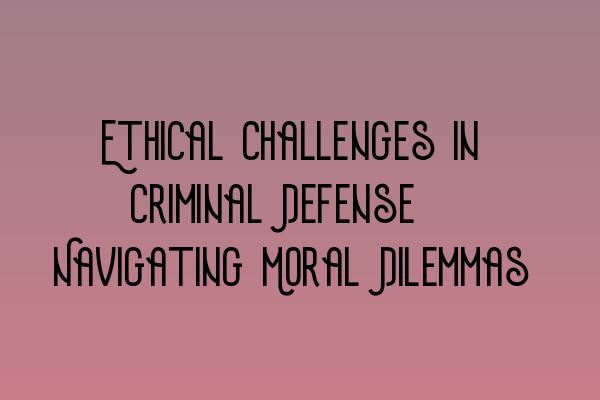Ethical Challenges in Criminal Defense: Navigating Moral Dilemmas
As criminal defense lawyers, we are often faced with ethical challenges and moral dilemmas that require careful navigation. Our role is to protect the rights and interests of our clients while also upholding the principles of justice. This delicate balance can sometimes put us in difficult situations where our personal values and professional obligations collide.
The Client’s Right to a Fair Defense
One of the fundamental ethical principles in criminal defense is the client’s right to a fair defense. We have a duty to provide zealous representation and advocate for our clients’ interests, regardless of their guilt or innocence. This means that we must pursue every available legal avenue and provide our clients with the best possible defense.
However, this commitment to the client’s rights can sometimes clash with our own moral compass. We may find ourselves representing individuals whose actions we personally find abhorrent or morally wrong. In these instances, it is important to remind ourselves of the principles of justice and the importance of a robust legal system that ensures everyone receives a fair and impartial trial.
The Ethical Dilemma of Knowing the Truth
Another ethical challenge faced by criminal defense lawyers is the dilemma of knowing the truth. Our duty is to vigorously defend our clients, even if we suspect they may be guilty. This can be a difficult pill to swallow, especially when we have evidence that points to their guilt.
However, it is crucial to remember that our role is not to act as judge and jury. Our job is to challenge the prosecution’s case, expose flaws in the evidence, and ensure that our clients receive a fair trial. In this sense, our duty is to the process of justice rather than the determination of guilt or innocence.
Balancing Confidentiality and Public Interest
Confidentiality is a cornerstone of the attorney-client relationship. We are bound by strict rules of confidentiality that protect the information shared by our clients. However, there may be instances where the interests of the public or wider society conflict with our duty of confidentiality.
For example, if a client confesses to a serious crime and intends to harm others, we may face a moral dilemma. On the one hand, we have a duty to protect the public from harm. On the other hand, we have a duty to maintain the trust and confidentiality of our client.
Navigating this ethical challenge requires careful consideration and judgment. In such cases, we may need to consult with legal and ethical experts to determine the best course of action that balances the interests of our client and the public.
Conclusion
Ethical challenges are an inherent part of criminal defense practice. As lawyers, we must continuously navigate moral dilemmas while upholding the principles of justice. Our commitment to providing a fair defense, knowing the truth, and balancing confidentiality with the public interest allows us to fulfill our professional obligations while maintaining our integrity.
For more information on SQE preparation, please check out these related articles:
- SQE 1 Practice Exam Questions
- SQE 1 Practice Mocks FLK1 FLK2
- SQE 2 Preparation Courses
- SQE 1 Preparation Courses
- SRA SQE Exam Dates
